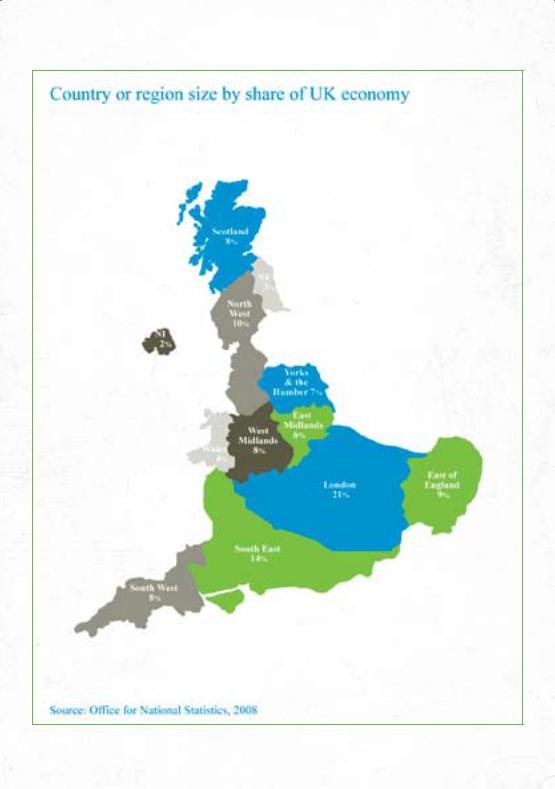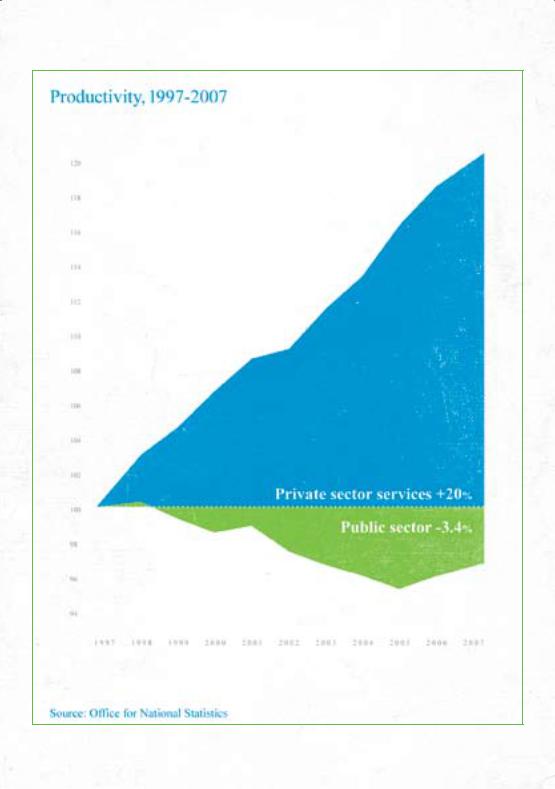
Программа Консерваторов
.pdf
change the economy | Encourage enterprise
Reduce regulation
Increasing amounts of red tape and complex regulation have eroded Britain’s reputation as a good place to invest, create jobs or start a business. A Conservative government will introduce regulatory budgets: forcing any government body wanting to introduce a new regulation to reduce regulation elsewhere by a
greater amount. And we will give the public the opportunity to force the worst regulations to be repealed.
To encourage new businesses to start up, we will reduce the number of forms needed to register a new business – moving towards a ‘one-click’ registration model – to make Britain the fastest place in the world to start a business, and end the restrictions on social tenants starting a business from their homes.
We are proud of the last Conservative government’s industrial relations reforms, which helped bring about our economic revival in the 1980s, and we will always be prepared to build on them if necessary.
Support innovation and sustainable development
Government procurement is a £200 billion a year market that can be used much better to stimulate enterprise and innovation. We will take steps to open up government procurement to small and innovative businesses by:
•publishing online all government tender documents for contracts worth over £10,000 via the Supply2Gov website;
•creating a level playing field for open source
ICT in government procurement; and,
•opening up contracts to SMEs by breaking up large ICT projects into smaller components.
Britain’s complex and unwieldy planning system has long been cited as a significant barrier to growth and wealth creation. We will create a presumption in favour of sustainable development in the planning system. We will abolish the unelected Infrastructure Planning
Commission (IPC) and replace it with an efficient and democratically-accountable system that provides a fast-track process for major infrastructure projects. We will:
•use private or hybrid Bills to promote major projects, such as our plans for a national high speed rail network;
•ensure that all other major infrastructure projects are considered at planning inquiries which have binding timetables and which focus on planning issues – with final permission given by a Minister; and,
•provide transitional arrangements for projects already before the IPC to ensure that these projects are not disrupted or delayed.
20

change the economy | Encourage enterprise
Attract the brightest and best to our country
Immigration has enriched our nation over the years and we want to attract the brightest and the best people who can make a real difference to our economic growth. But immigration today is too high and needs to be reduced. We do not need to attract people to do jobs that could be carried out by British citizens, given the right training and support. So we will take steps to take net migration back to the levels of the 1990s – tens of thousands a year, not hundreds of thousands.
To help achieve this goal, we will introduce a number of measures, such as:
•setting an annual limit on the number of non-
EU economic migrants admitted into the UK to live and work;
•limiting access only to those who will bring the most value to the British economy; and,
•applying transitional controls as a matter of course in the future for all new EU Member States.
In addition, we will promote integration into British society, as we believe that everyone coming to this country must be ready to embrace our core values and become a part of their local community. So there will be an English language test for anyone coming here to get married.
We want to encourage students to come to our universities and colleges, but our student visa system has become the biggest weakness in our border controls. A Conservative government will strengthen the system of granting student visas so that it is less open to abuse. We want to make it easier for reputable universities and colleges to accept applications, while putting extra scrutiny on new institutions looking to accept foreign students or existing institutions not registered with Companies House. In addition, we will:
•insist foreign students at new or unregistered institutions pay a bond in order to study in this country, to be repaid after the student has left the country at the end of their studies;
•ensure foreign students can prove that they have the financial means to support themselves in the UK; and,
•require that students must usually leave the country and reapply if they want to switch to another course or apply for a work permit.
21

22

change the economy ENSURE THE WHOLE COUNTRY SHARES IN RISING PROSPERITY
Ensure the whole country shares in rising prosperity
We will increase the private sector’s share of the economy in all regions of the country, especially outside London and the South East.
Too many areas of the UK lack a vibrant private sector and are too dependent on public spending. These regional imbalances have got worse over the last decade, despite billions of pounds spent by the Regional Development
Agencies (RDAs). Our aim is to increase the private sector’s share of the economy in every part of the country by boosting enterprise and creating a better business environment. We will work closely with local government, and with the Scottish Parliament, Welsh Assembly and Northern Ireland Assembly, to achieve this goal.
join up major cities across England, Scotland and Wales. Stage two will deliver two new lines bringing the North East, Scotland and Wales into the high speed rail network.
Because travel abroad is so important for our economy and for family holidays, we need to improve our airports and reduce the environmental impact of flying. Our goal is to make Heathrow airport better, not bigger. We will stop the third runway and instead link Heathrow directly to our high speed rail
network, providing an alternative to thousands of flights. In addition, we will:
Create a modern transport network
A rebalanced economy requires an extensive and reliable infrastructure. But transport has been a low priority for Labour, and the hassle of getting around is bad for business, bad for families and bad for everyone’s quality of life.
A Conservative government will begin work immediately to create a high speed rail line connecting London and Heathrow with Birmingham, Manchester and Leeds. This is the first step towards achieving our vision of creating a national high speed rail network to
•block plans for second runways at Stansted and Gatwick; and,
•reform Air Passenger Duty to encourage a switch to fuller and cleaner planes.
To improve life for commuters and encourage people to switch to lower carbon public transport, we will reform our railways to provide a better focus on tackling problems that matter most to passengers, such as overcrowding. We will grant longer, more flexible rail franchises to incentivise private sector investment in improvements like longer trains and better stations.
23

change the economy ENSURE THE WHOLE COUNTRY SHARES IN RISING PROSPERITY
We support Crossrail and the electrification of the Great Western line to South Wales. We will turn the rail regulator into a powerful passenger champion and reform Network Rail to make it more accountable to its customers. And we will introduce a moratorium on building on disused rail lines still in public ownership, so they are available to be re-opened.
Britain has the chance to lead the world in making our transport system greener. So we will introduce incentives for electricity network operators to establish a new national car recharging network, making it much easier
for drivers to move to electric and plug-in hybrid vehicles. We will support sustainable travel initiatives that work best for local communities by:
•giving the concerns of cyclists much greater priority;
•encouraging partnerships between
bus operators and local authorities; and,
•helping people cut down on work-related travel.
We will stop central government funding for new fixed speed cameras, and switch to more effective ways to make our roads safer,
including authorising ‘drugalyser’ technology for use in testing for drug-driving. We
will make companies that dig up our roads accountable for the congestion they cause and crack down on rogue clampers. Councils will
get more powers to get traffic flowing more smoothly.
We will consult on the introduction of a ‘Fair Fuel Stabiliser’. This would cut fuel duty when oil prices rise, and vice versa. It would ensure families, businesses and the whole
British economy are less exposed to volatile oil markets, and that there is a more stable environment for low carbon investment.
Spread prosperity
We want Britain to become a European hub for hi-tech, digital and creative industries – but this can only happen if we have the right infrastructure in place. Establishing a superfast broadband network throughout the UK could generate 600,000 additional jobs and add £18 billion to Britain’s GDP.
We will scrap Labour’s phone tax and instead require BT and other infrastructure providers to allow the use of their assets to deliver superfast broadband across the country. If necessary, we will consider using the part of the licence fee that is supporting the digital switchover to fund broadband in areas that the market alone will not reach.
We will give councils and businesses the power to form their own business-led local enterprise partnerships instead of RDAs. Where local councils and businesses want to maintain regionally-based enterprise partnerships, they
24

change the economy ENSURE THE WHOLE COUNTRY SHARES IN RISING PROSPERITY
will be able to. Local government should be at the heart of our economic recovery, so we will:
•allow councils to keep above-average increases in business rate revenue so that communities which go for growth can reap the benefits;
•give councils new powers to introduce further discounts on business rates; and,
•introduce an immediate freeze of, and inquiry into, the Government’s punitive programme of back-dating business rates on ports.
25

26

change the economy REFORM PUBLIC SERVICES TO DELIVER BETTER VALUE FOR MONEY
Reform public services to deliver better value for money
We will raise productivity growth in the public sector in order to deliver better schools and a better NHS.
Public sector productivity has fallen under Labour, acting as a drag on growth and reducing the quality of our public services. If productivity in the public sector had grown at the same rate as in private sector services, we could now have the same quality of public services for £60 billion less each year. So, by improving public sector productivity while getting a grip on the debt, we will still be able to deliver better public services. That
is why good government costs less with the Conservatives.
Decentralisation, accountability and transparency
We value the work of those employed in our public services, and a Conservative government will work with them to deliver higher productivity and better value for money for taxpayers. We will raise public
sector productivity by increasing diversity of provision, extending payment by results and giving more power to consumers.
Giving public sector workers ownership of the services they deliver is a powerful way to drive efficiency, so we will support co-operatives and mutualisation as a way of transferring public assets and revenue streams to public sector
workers. We will encourage them to come together to form employee-led co-operatives and bid to take over the services they run. This will empower millions of public sector workers to become their own boss and help them to deliver better services – the most significant shift in power from the state to working people since the sale of council houses in the 1980s.
Transparency is crucial to creating a value for money culture. We will publish all items of spending over £25,000 online, and the salaries of senior civil servants in central government will also be published. We will create strong financial discipline at all levels of government and place an obligation to manage taxpayers’ money wisely at the heart of civil service employment contracts. In addition, we will:
•introduce and publish a standard set of cost measures that capture the key drivers of departmental spending;
•help departmental Finance Directors to manage resources more efficiently;
•implement clear financial performance targets for senior civil servants; and,
•create a focus on delivering strong financial management across government.
27

28

change the economy create a safer banking system that serves the needs of the economy
Create a safer banking system that serves the needs of the economy
We will reform the regulation and structure of the banking system to ensure lower levels of leverage, less dependence on unstable wholesale funding, and greater availability of credit for SMEs.
In the run up to the financial crisis, British banks became amongst the most indebted and most leveraged in the world – with disastrous consequences for us all. This credit boom turned into a bust, with a significant fall in credit available to firms. Lack of access to credit remains a major problem, especially for SMEs. We need to change the way we regulate our banks to stop a crisis on this scale ever happening again.
Reform financial services
The financial services sector is one of our most globally successful industries, and we want the City to be the leading location for global
finance. But the financial sector must not put the stability of the whole economy at risk.
We will put in place a levy on banks. We are prepared to act unilaterally if necessary, but there is emerging international agreement on this approach and the US and German governments have both announced similar plans.
We need fundamental reform of our failed regulatory system, avoiding badlydesigned regulations that will damage our
competitiveness and ensuring that the financial
sector can supply the affordable credit that businesses need.
We will abolish Gordon Brown’s failed tripartite system of regulation and put the Bank of England in charge of prudential supervision. We will restore the Bank’s historic role in monitoring
the overall growth of credit and debt in the economy. In addition, we will:
•pursue international agreement to prevent retail banks from engaging in activities, such as large-scale proprietary trading, that put the stability of the system at risk;
•empower the Bank of England to crack down on risky bonus arrangements;
•increase competition in the banking industry, starting with a study of competition in the sector to inform our strategy for selling the government’s stakes in the banks; and,
•as the government comes to sell off its holdings in the banks, offer a ‘people’s bank bonus’, so that everybody in the country has the chance to buy a stake in the state-owned banks.
We will create more diverse sources of affordable credit for small businesses, building on our proposals for a National Loan Guarantee Scheme.
29
